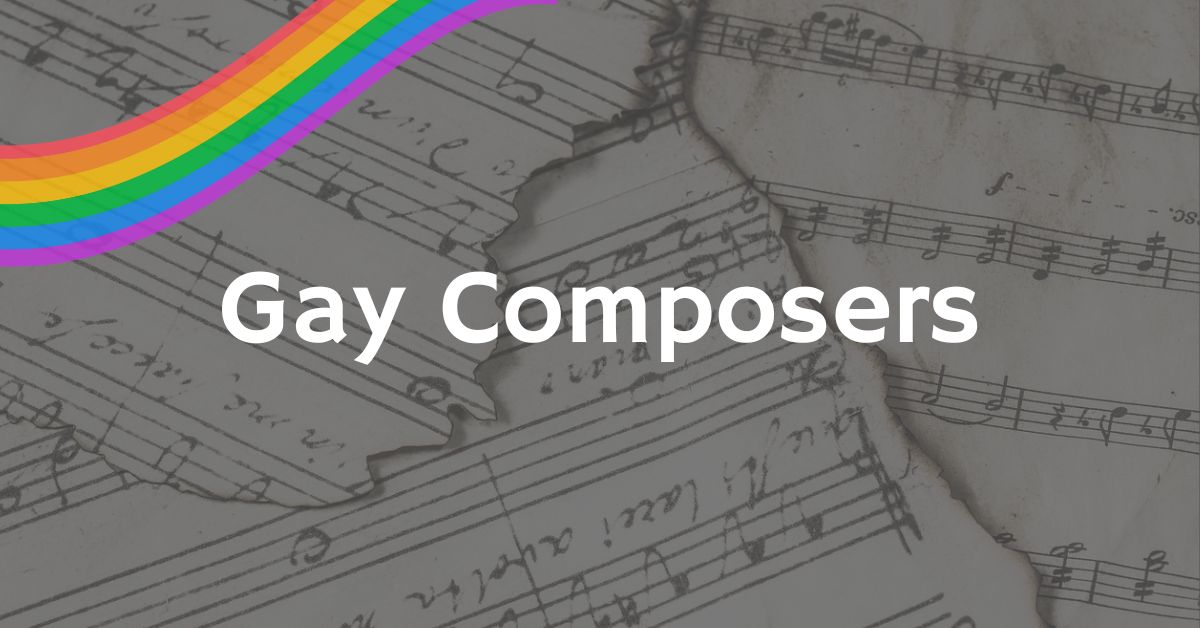Great Gay Composers in History: Celebrating LGBTQ+ Musical Geniuses
Throughout history, the world of classical music has been enriched by the contributions of countless composers whose works have stood the test of time. Among these luminaries are several great composers who were gay, bisexual, or otherwise part of the LGBTQ+ community. Their sexual orientations, though often hidden or suppressed due to the social norms of their eras, are an important part of their stories. This article celebrates the legacies of some of these remarkable composers, highlighting their contributions to music and their courage in living authentically in often challenging times.
List of Gay Composers
Here are some of the most influential gay composers in classical music history:
1. Pyotr Ilyich Tchaikovsky (1840–1893)
One of the most celebrated composers of the Romantic era, Tchaikovsky is best known for his ballets Swan Lake, The Nutcracker, and Sleeping Beauty, as well as his symphonies and operas. Tchaikovsky was gay, a fact that was long suppressed or downplayed due to the conservative attitudes of his time in Russia. His personal life was marked by turmoil, including a brief and disastrous marriage to a woman, which he entered in an attempt to conform to societal expectations. Despite the challenges he faced, Tchaikovsky’s music remains beloved worldwide for its emotional depth and melodic brilliance.
2. Benjamin Britten (1913–1976)
Benjamin Britten, one of the most important British composers of the 20th century, was openly gay at a time when homosexuality was still criminalized in the UK. He shared a lifelong partnership with tenor Peter Pears, who was not only his muse but also his collaborator. Britten’s operas, such as Peter Grimes and Billy Budd, often explored themes of outsiderhood and societal rejection, reflecting his own experiences as a gay man. His music is celebrated for its innovation and emotional resonance.
3. Francis Poulenc (1899–1963)
French composer Francis Poulenc was a member of Les Six, a group of avant-garde composers who sought to break away from the traditions of Romanticism. Poulenc was openly gay, and his sexuality influenced much of his work, including his opera Les Mamelles de Tirésias and his sacred music, such as the Gloria and Stabat Mater. His music is known for its wit, charm, and emotional depth, blending modernism with a distinctly French sensibility.
4. Aaron Copland (1900–1990)
Aaron Copland, often referred to as the “Dean of American Composers,” was a pioneering figure in American classical music. While Copland never publicly came out during his lifetime, his homosexuality was an open secret among his peers. His works, such as Appalachian Spring, Fanfare for the Common Man, and Rodeo, are iconic representations of American musical identity. Copland’s ability to capture the spirit of a nation while living authentically as a gay man is a testament to his artistry and resilience.
5. Leonard Bernstein (1918–1990)
Leonard Bernstein, the legendary composer, conductor, and pianist, was bisexual. Best known for his groundbreaking musical West Side Story, Bernstein was a larger-than-life figure in the world of music. While he was married to actress Felicia Montealegre, Bernstein had relationships with men throughout his life. His work as a composer, educator, and advocate for social justice continues to inspire generations of musicians and audiences.
6. Ethel Smyth (1858–1944)
Dame Ethel Smyth, a trailblazing British composer and suffragette, was openly lesbian at a time when such openness was rare. Her operas, such as The Wreckers and The Boatswain’s Mate, were groundbreaking for their time, and she was the first female composer to have an opera performed at the Metropolitan Opera in New York. Smyth’s music and activism challenged societal norms, making her a pioneering figure in both the musical and LGBTQ+ communities.
7. Samuel Barber (1910–1981)
American composer Samuel Barber, best known for his Adagio for Strings, was gay and shared a lifelong partnership with fellow composer Gian Carlo Menotti. Barber’s music is celebrated for its lyrical beauty and emotional intensity, and his works remain staples of the classical repertoire. Despite the challenges of living as a gay man in mid 20th century America, Barber’s music continues to resonate with audiences worldwide.
8. Jean-Baptiste Lully (1632–1687)
Jean-Baptiste Lully, the Italian-born French composer of the Baroque era, was openly gay and a favorite of King Louis XIV. Lully’s contributions to French opera and ballet were revolutionary, and his works, such as Armide and Atys, remain influential. While his personal life was often the subject of scandal, Lully’s musical genius is undeniable.
9. John Cage (1912–1992)
John Cage, the avant-garde composer known for his experimental works such as 4’33”, was openly gay. Cage’s relationship with choreographer Merce Cunningham, which lasted nearly five decades, was a central part of his life and work. Cage’s innovative approach to music and his embrace of unconventional ideas made him a pivotal figure in 20th century music.
10. Ned Rorem (1923–2022)
Ned Rorem, an American composer and diarist, was openly gay and wrote extensively about his life and relationships. Known for his art songs and orchestral works, Rorem’s music is celebrated for its lyrical beauty and emotional depth. His candid writings about his sexuality and experiences as a gay man in the mid 20th century provide valuable insight into the challenges faced by LGBTQ+ artists.
Honoring Their Legacies
The contributions of these great composers have left an indelible mark on the world of music. While many of them faced societal pressures and discrimination due to their sexual orientations, their courage and creativity continue to inspire. By celebrating their lives and works, we not only honor their artistic achievements but also acknowledge the importance of diversity and inclusion in the arts. Their stories remind us that great art often emerges from the courage to live authentically, even in the face of adversity.

